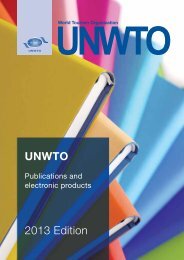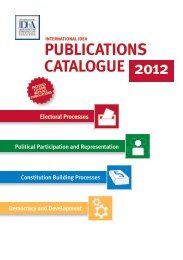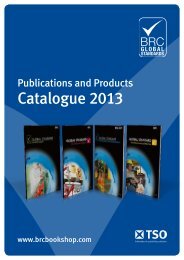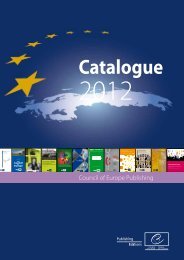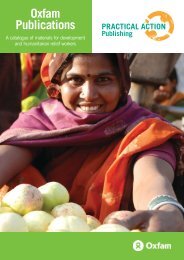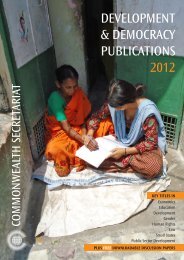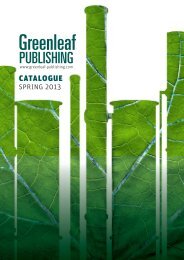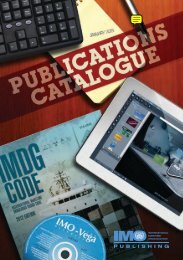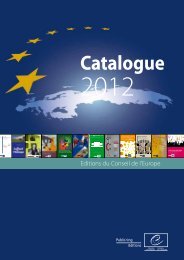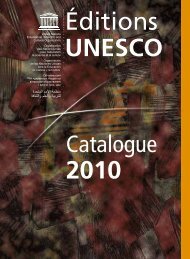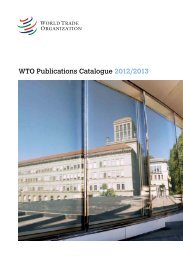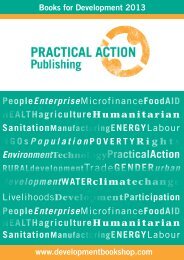UNESCO 2010/11 - Renouf Publishing Co. Ltd.
UNESCO 2010/11 - Renouf Publishing Co. Ltd.
UNESCO 2010/11 - Renouf Publishing Co. Ltd.
Create successful ePaper yourself
Turn your PDF publications into a flip-book with our unique Google optimized e-Paper software.
United Nations<br />
duational ienti and<br />
Cultural Organization<br />
NATURAL SCIENCES<br />
29<br />
This Report is a platform for the better<br />
understanding of engineering, and of the roles<br />
and responsibilities of engineers who may be<br />
responsible for the safety of thousands of people.<br />
The first ever international report on engineering<br />
from <strong>UNESCO</strong> is intended to identify issues<br />
and challenges facing engineering, promote<br />
better understanding of engineering and its role,<br />
and highlight ways of making engineering more<br />
attractive to young people, especially women.<br />
FORTHCOMING<br />
The <strong>UNESCO</strong> History of Water and<br />
Civilization<br />
No substance has been as essential to the rise<br />
of civilization as water. Our modern societies<br />
are facing severe shortages of freshwater, under<br />
pressure from ever-increasing demand. The<br />
situation constitutes an unprecedented global<br />
water crisis. These developments are the result<br />
of current governance strategies intertwined<br />
with complex historically-grounded cultural<br />
dynamics influenced by economic forces,<br />
social structures, demographic processes and<br />
ideological standpoints. Yet the vast majority of<br />
contemporary responses to water shortages have<br />
tended to focus on technological solutions. By<br />
adopting a cross-cultural, historical perspective<br />
on water problems and by placing technological<br />
solutions within their appropriate cultural and<br />
historical contexts, we are bound to achieve<br />
greater success in coping with the water crisis,<br />
and in shaping sustainable solutions. A clear<br />
understanding of the ethics of freshwater<br />
management and its relationship to issues<br />
of equity (notably gender equity), and social<br />
solidarity will also contribute to a better sharing<br />
of water resources.<br />
The <strong>UNESCO</strong> International Hydrological<br />
Programme is launching a seven-volume series<br />
on the History of Water and Civilization<br />
that will look at water from a global and<br />
interdisciplinary perspective. It will examine<br />
its interdependent social, cultural, political,<br />
environmental and scientific facets and explore<br />
directions in water management that draw<br />
inspiration from the collective experiences<br />
of humankind. The series will also serve as a<br />
resource for other educational and informationsharing<br />
activities. It targets policymakers,<br />
engineers and other water professionals, as well<br />
as managers, educators, experts in all fields and<br />
the public in general.<br />
Vol I - Water and Humanity: Historical Overview<br />
explores key issues and cultural developments<br />
in humanity’s relationships with water, taking<br />
a holistic anthropological approach. It reveals<br />
not only how various institutions and forces<br />
at successive historical junctures have brought<br />
about transformations in how water is used and<br />
conceptualized, but also how our interactions<br />
with water have transformed the way we see<br />
ourselves and the world.<br />
NEW<br />
<strong>UNESCO</strong><br />
<strong>Publishing</strong><br />
<strong>UNESCO</strong><br />
SCIENCE<br />
REPORT<br />
<strong>2010</strong><br />
The Current State of Science<br />
around the World<br />
<strong>UNESCO</strong> Science Report <strong>2010</strong><br />
The Current State of Science around the World<br />
<strong>UNESCO</strong> Reference Works series<br />
<strong>2010</strong>, 536 pp., fig., boxes, tables, photos, 29.7 × 21 cm<br />
ISBN 978-92-3-104132-7<br />
€ 29.00<br />
<strong>UNESCO</strong> <strong>Publishing</strong><br />
The latest in a series which analyses the status of<br />
science worldwide every five years, the <strong>UNESCO</strong><br />
Science Report <strong>2010</strong> is divided into national<br />
and regional chapters, each written by experts<br />
who hail from the same country or region they<br />
are covering. The first chapter provides a global<br />
overview of the main developments in scientific<br />
research, innovation and higher education since<br />
2005. Subsequent chapters provide a regional<br />
perspective of the situation in Latin America,<br />
the Caribbean, European Union, Southeast<br />
Europe, Arab states, sub-Saharan Africa, Central<br />
Asia, South and Southeast Asia and the South<br />
Pacific. These regional chapters are interspersed<br />
with national chapters shining the spotlight on<br />
Brazil, Canada, China, Cuba, India, Iran, Japan,<br />
Republic of Korea, Russian Federation, Turkey<br />
and the USA.<br />
‘What effect is the current global economic<br />
recession having on national science systems?’<br />
‘How fast are the national innovation systems<br />
developing in the BRIC countries (Brazil,<br />
Russian Federation, India, China)? Which<br />
new players are emerging in an increasingly<br />
multipolar world?’ And ‘which countries are<br />
experiencing difficulties in maintaining their<br />
current status in an increasingly competitive<br />
global environment?’ ‘What new R&D priorities<br />
are emerging in a world confronted with<br />
climate change and growing food, water and<br />
energy insecurity?’ The report answers all these<br />
questions and more.<br />
This volume will come as a valuable addition<br />
to the library of all ‘science watchers’, be they<br />
academics, policy-makers, private businesses<br />
or members of the general public interested in<br />
learning how contemporary issues are shaping<br />
science.<br />
Forthcoming in French: Rapport de l’<strong>UNESCO</strong> sur la<br />
science <strong>2010</strong><br />
<strong>UNESCO</strong> Science Report 2005<br />
<strong>UNESCO</strong> Reference Works series<br />
Foreword by Koïchiro Matsuura, Director-General of<br />
<strong>UNESCO</strong><br />
2005, 274 pp., tables, figures, references 29.7 × 21 cm<br />
ISBN 978-92-3-103967-6<br />
€ 44.00<br />
<strong>UNESCO</strong> <strong>Publishing</strong><br />
The <strong>UNESCO</strong> Science Report 2005 is the<br />
fourth in a series which periodically presents a<br />
global overview of science. It reviews the state<br />
of science around the world through the eyes<br />
of an independent team of experts. A series<br />
of informative and thought-provoking essays<br />
identifies and discusses emerging trends in<br />
scientific research and higher education.<br />
Each chapter describes how research and<br />
development are organized in a given region<br />
or country. Who is performing research and<br />
development today? Where and with what<br />
means? What are the new priorities?<br />
Authoritative and readable, the <strong>UNESCO</strong><br />
Science Report 2005 brings together an extensive<br />
number of figures and tables to help understand<br />
how contemporary issues are shaping science.<br />
Also published in French: Rapport de l’<strong>UNESCO</strong> sur<br />
la science 2005<br />
Water, a Shared Responsibility<br />
The United Nations World Water Development Report 2<br />
Foreword by Kofi Annan, UN Secretary General. Prologue<br />
by Koïchiro Matsuura, Director-General of <strong>UNESCO</strong>.<br />
Preface by Gordon Young, WWAP <strong>Co</strong>ordinator.<br />
2006, xvi + 584 pp., maps, figures, tables, index,<br />
27 × 20 cm + CD-ROM<br />
ISBN 978-92-3-104006-1<br />
€ 56.00<br />
<strong>UNESCO</strong> <strong>Publishing</strong>/Berghahn Books<br />
Based on the collective input of 24 United<br />
Nations agencies and in partnership with many<br />
governments, Water, A Shared Responsibility<br />
provides a comprehensive assessment of the<br />
state of the world’s freshwater resources, critical<br />
water-related problems and societies’ coping<br />
mechanisms. This 2006 edition of the World<br />
Water Development Report, first published in<br />
2003, draws on an extensive database, expert<br />
analyses, case studies and hundreds of graphic<br />
elements to offer a more integrated vision of<br />
water resource management. The report points<br />
to a prevalent lack of capacity and knowledge<br />
base as today’s primary obstacles to achieving<br />
the necessary levels of water governance and<br />
illustrates that only our global cooperation<br />
will help to ensure an integrated equitable and<br />
sustainable management of the world’s most<br />
precious resource – water.





